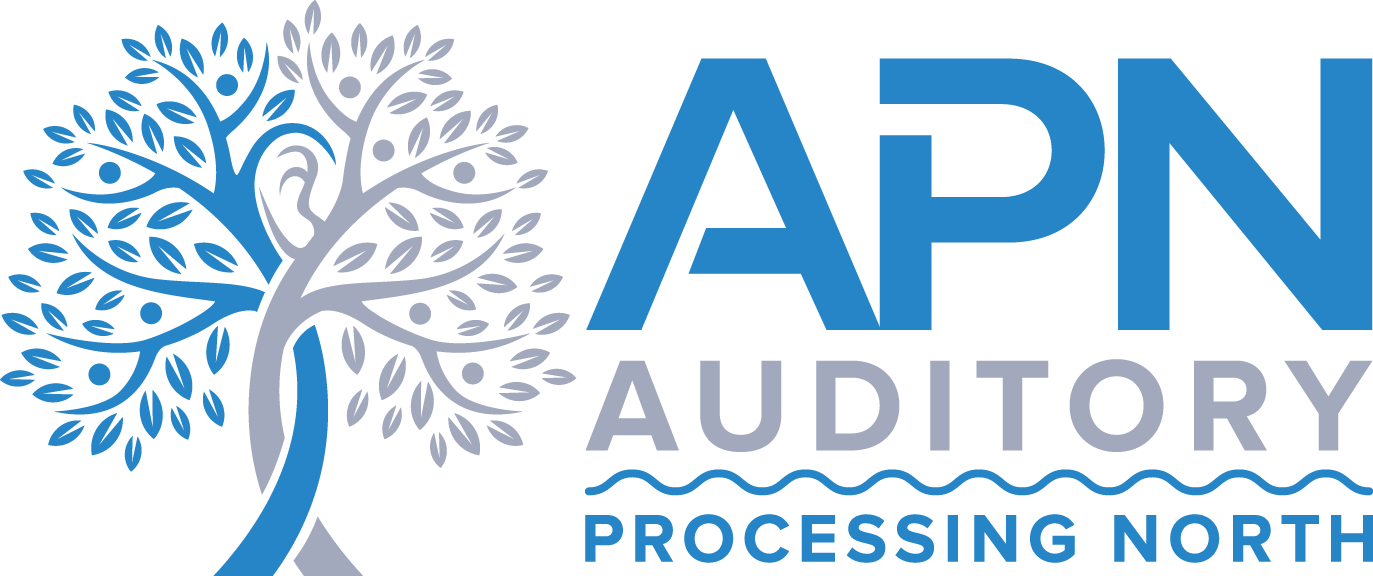Welcome to AUDITORY PROCESSING NORTH: Auditory Processing & Skill Development for children and adults of all ages. Here at ADN we focus on assessment and deficit specific therapy of auditory processing and auditory skill development for those with hearing loss.
So what is APD?
Auditory processing has been referred to as what we do with what we here. Our ears collect this sounds from our from the outside world in send sound along the central auditory pathway to important structures. This pathway is responsible for decoding each individual sound which allows your brain to attach meaning to that sound. Our brain has a way to string together individual complex beats of sound process those sounds and give us the ability to understand words, read the story sing a song in process speech in the presence of background noise. So the coordination of the ear, the central auditory pathways AND the brain must be exact so the sounds that make up the words line up and are not miss heard or misunderstood.


Children or adults with this difficulty often show symptoms in less-than-ideal listening situations like background noise, rapid speakers and heavily loaded information. Although hearing acuity or the ability to hear a very quiet sound is normal adding background noise to the environment causes a person with an auditory processing disorder to receive blurry sounds therefore making it difficult for them to differentiate for example an M sound versus a N sound. In these difficult listening situations, it becomes harder and harder to keep up as sounds that are not clear affect the listening, auditory learning then affecting comprehension and subsequent learning skills such as decoding, and memory.

Auditory Processing Skills
The symptoms of CAPD can look similar to other conditions, like learning disabilities or attention deficit hyperactivity disorder (ADHD). It’s important that children with CAPD are accurately diagnosed so they can receive the therapy that best meets their needs.
Signs your child may have CAPD include:
- A tendency to be easily distracted
- Academic difficulties, including reading, spelling and/or learning problems
- Difficulty determining the source of a signal or sound
- Difficulty following directions
- Difficulty following rapid speech
- Difficulty learning a foreign language or novel speech materials
- Difficulty maintaining attention
- Difficulty or inability to detect the changes in rhythm, stress, and intonation in speech
- Difficulty understanding speech when there is competing background noise
- Frequent requests to repeat or rephrase information
- Inconsistent or inappropriate responses to requests for information
The human brain possesses a variety of auditory processing skills that allow it to interpret sounds. These skills are most often dependent on each other. The brain uses these skills in different combinations to help a person hear what is happening around them and understand the meaning.
APD evaluations at APN typically involve testing the following areas:
Peripheral auditory system- Assessment of outer, middle and inner ear structures and function to rule out a hearing loss
Word recognition in quiet conditions and in noise
Localization: Identifying where sounds are coming from. This is important to be able to sort speech out from background noise.
Decoding: Identifying different types of sounds and patterns This is a Critical skill for language learning and is the building blocks for reading
Temporal Processing: Identifying timing and pitch differences, fundamental skills t processing
Binaural Integration/Binaural Separation: Taking sounds coming from two ears and putting it together/ or focusing on one ear and its input ignoring the other.
Treatment
APD is treatable. Neural reorganization is referred to as neuroplasticity. Auditory therapy takes advantage of the fact that neural responses to sound can be changed intentionally through intensive listening exercises.
We offer APD therapy for both children and adults. At APDNORTH, individuals struggling with APD and the subsequent reading and learning difficulties, receive highly individualized treatment to overcome their learning challenges and reach their full potential to compete in a classroom setting. Auditory processing is too complicated for one approach to work for all individuals.
Auditory Processing North offers a wide variety of treatment programs and personalized activities to address each individual’s specific auditory deficits. The type, frequency, and intensity of therapy will vary with each child or adult based on the specific type(s) of auditory processing issues identified. We offer in-clinic therapy, online therapy, guided home-based treatment, and one-on-one teletherapy for auditory processing disorder.
Auditory Processing Center offers personalized recommendations and options for anyone who is struggling with auditory processing deficits.
Therapy options include:
- Deficit specific auditory training sessions to improve auditory processing. Treatment goals are individualized and include sessions with our audiologist to improve the specific areas delineated with the comprehensive assessment.
- Therapy to improve dichotic listening skills
- Customized web-based programs monitored on-site while exercises are implemented at home.
- Speech-in-noise/auditory figure-ground therapy and/or background noise desensitization
- Virtual auditory processing services. Teletherapy allows us to provide APD therapy for individuals without access to a specialist in their area.
- Auditory-Verbal/ auditory training therapy for children with hearing aids or cochlear implant Auditory training and auditory processing therapy for adults. We off treatment for adults with APD and also provide therapy for adults using hearing technology (such as hearing aids or cochlear implants) to maximize the benefit these individuals receive from these devices.
- Assistive Listening Devices/Hearing Aids/ Remote Mic technology for auditory processing deficits
For More Information
Our Locations
15 Government Rd E #2
Kirkland Lake, ON
P2N 1A1
116 Whitewood
New Liskeard, ON
P0J 1P0
Customer Service
Tel: 1-800-859-6754
Tel: 1-705-567-1115
